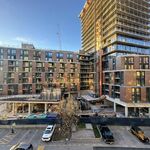U
unimaginative2
Guest
Election buzz moves to 'burbs
905 leadership poised for big change
New voices may alter political landscape
Sep. 19, 2006. 05:48 AM
LAURIE MONSEBRAATEN
FEATURE WRITER
Step aside, Toronto. The spotlight for this fall's municipal elections is shifting to the suburbs.
And that's a good thing.
The burgeoning cities and towns just outside Toronto hold the keys to solving many of the GTA's problems of traffic gridlock, garbage disposal, urban sprawl and immigrant settlement.
With several incumbent mayors facing serious challenges and vacancies elsewhere promising new blood, voters in the regions should be pushing candidates for their vision on the broad urban issues that affect us all.
Where do the candidates stand, for example, on transit integration — and a "smart card" to go with it — that would enable riders to take a local bus from Oakville to Milton or from Scarborough to Markham?
Why don't we build an incinerator in Halton big enough to serve Toronto and other GTA municipalities so we don't have to bury our garbage or truck trash to Michigan?
And why are some suburban municipalities determined to pave over apple farms at a time when area residents crave green space like never before?
"It's overdue for the 905 area to get serious attention around the municipal issues and choices that those communities are facing," says Ryerson University urban politics professor Myer Siemiatycki.
"The decisions those councils are making will not only affect their own local neighbourhoods, they'll affect the entire region."
From Burlington in the west, Newmarket to the north and Clarington in the east, leadership on the edges of Greater Toronto is poised for change.
Not since 1991 has Burlington council faced the kind of renewal expected in this election, says retiring mayor Rob MacIsaac.
Along with the mayor's job, two of the council's six seats are up for grabs, with former Ward 5 Councillor Mike Wallace now an MP and Ward 2 Councillor Joan Lougheed running for mayor.
And if long-time Burlington Tory MPP Cam Jackson enters the mayoral race, as expected, it could become a heated battle.
Halton chair Joyce Savoline is stepping down after 12 years, opening up the possibility for a real race for that office. (Halton is the only region in Greater Toronto where the chair is directly elected by voters rather than by regional councillors.) Former Liberal MP Gary Carr, who lost his Halton seat to Tory Garth Turner in last winter's federal election, is running and would appear to have a lock on the job. However, rumours of another high-profile candidate expected to declare before nominations close Sept. 29 could give Burlington and Halton voters another interesting contest.
In neighbouring Oakville, Mayor Ann Mulvale is squaring off again against former YTV founder and environmentalist Rob Burton who came within 30 votes of unseating her in 2003.
North of Toronto, in York Region, where Vaughan Mayor Michael Di Biase had trouble winning against a virtual unknown in 2003, Regional Councillor Linda Jackson, the daughter of popular former mayor Lorna Jackson, is expected to pose a serious threat.
Three other mayors in York are leaving office, creating open races in Newmarket, Richmond Hill and Markham. Departing Markham Mayor Don Cousens says strong deputy mayors are running in all three contests and won't likely face strong opposition. But it's still early days.
In Durham, where regional council has spent the past two years embroiled in open warfare against the province's greenbelt legislation, environmentalists are mounting stiff challenges in several races. Pickering activist Bonnie Littley is taking her second stab at local politics, running this time against Regional Councillor Maurice Brenner, who is facing criminal charges for allegedly filing false expense claims in 1999 and 2000. And in Clarington, Linda Gasser has a good chance of replacing Councillor Bill Schell who is running for mayor. Meanwhile, current Mayor John Mutton, who is facing assault charges, could be in trouble.
A referendum on the municipal ballot in Pickering, Ajax and Oshawa will ask residents if they want to join Halton and become the second region in the GTA to directly elect their regional chair. Ajax Mayor Steve Parish believes this could be one of the most pivotal votes on Nov. 13 because a strong yes vote could pave the way for direction election in 2010.
"Until the regional chair is directly elected by the people, Durham will have no one who represents the values and wishes of the entire region," he says.
Not only is the local face of regional politics in for a shakeup, the provincial rules have changed, too.
Since the last municipal vote, the provincial government has jumped into local planning in a way not seen since the early 1970s. Greenbelt legislation and the Places to Grow Act, which directs new homes and businesses to built-up areas already served by water, sewers, roads and transit, may upset residents who are leery of highrise development.
Meanwhile, a long-awaited Greater Toronto Transportation Authority to co-ordinate provincial transportation investment in the area could cut off communities that don't plan effectively.
Local politicians, who can sell constituents on the advantages of making better use of main streets so that they encourage pedestrian shopping, cultural attractions and public transit have an opportunity to improve the quality of life for many suburban neighbourhoods, says Burlington's MacIsaac.
"But it takes political skill and can be pretty tough sledding," he admits.
Toronto's role in the city-region is also evolving.
Back in 2003, there was widespread optimism that Toronto Mayor David Miller would become the GTA's new cheerleader and that he would use his close relationships with powerful area mayors like MacIsaac and Mississauga's Hazel McCallion to forge a regional vision.
But Miller has been largely missing in action on the regional file as he battled local issues like youth crime and a waterlogged waterfront. What's worse, says Halton chair Savoline, he's actively pushed the regions away with his decision in July 2005 to take Toronto out of the Association of Ontario Municipalities (AMO), the province's main municipal lobby group.
However, Miller says Toronto has worked with the regions to get municipalities a share of the provincial and federal gas taxes. And Toronto continues to lobby with the regions for Queen's Park to remove social service costs from the property tax, he says.
Miller is prepared to entertain the idea of a pan-GTA governance structure "in the future." But it's not a priority.
"The immediate issue for all of us is to have Toronto on the proper economic footing, so the city of Toronto can succeed," he says, noting that McCallion makes this point often. "The GTA can't succeed without its heart being successful. I have a duty to focus all of my energy in ensuring Toronto is successful."
But that still leaves room for working together on issues of common interest across the region, he adds.
"My experience is when you get focused on the governance, it's all-absorbing. What we really need to do is act."
And choosing the politicians we want to act on our behalf is what elections are all about, Siemiatycki says.
Legal Notice: Copyright Toronto Star Newspapers Limited. All rights reserved. Distribution, transmission or republication of any material from www.thestar.com is strictly prohibited without the prior written permission of Toronto Star Newspapers Limited. For information please contact us using our webmaster form. www.thestar.com online since 1996.
905 leadership poised for big change
New voices may alter political landscape
Sep. 19, 2006. 05:48 AM
LAURIE MONSEBRAATEN
FEATURE WRITER
Step aside, Toronto. The spotlight for this fall's municipal elections is shifting to the suburbs.
And that's a good thing.
The burgeoning cities and towns just outside Toronto hold the keys to solving many of the GTA's problems of traffic gridlock, garbage disposal, urban sprawl and immigrant settlement.
With several incumbent mayors facing serious challenges and vacancies elsewhere promising new blood, voters in the regions should be pushing candidates for their vision on the broad urban issues that affect us all.
Where do the candidates stand, for example, on transit integration — and a "smart card" to go with it — that would enable riders to take a local bus from Oakville to Milton or from Scarborough to Markham?
Why don't we build an incinerator in Halton big enough to serve Toronto and other GTA municipalities so we don't have to bury our garbage or truck trash to Michigan?
And why are some suburban municipalities determined to pave over apple farms at a time when area residents crave green space like never before?
"It's overdue for the 905 area to get serious attention around the municipal issues and choices that those communities are facing," says Ryerson University urban politics professor Myer Siemiatycki.
"The decisions those councils are making will not only affect their own local neighbourhoods, they'll affect the entire region."
From Burlington in the west, Newmarket to the north and Clarington in the east, leadership on the edges of Greater Toronto is poised for change.
Not since 1991 has Burlington council faced the kind of renewal expected in this election, says retiring mayor Rob MacIsaac.
Along with the mayor's job, two of the council's six seats are up for grabs, with former Ward 5 Councillor Mike Wallace now an MP and Ward 2 Councillor Joan Lougheed running for mayor.
And if long-time Burlington Tory MPP Cam Jackson enters the mayoral race, as expected, it could become a heated battle.
Halton chair Joyce Savoline is stepping down after 12 years, opening up the possibility for a real race for that office. (Halton is the only region in Greater Toronto where the chair is directly elected by voters rather than by regional councillors.) Former Liberal MP Gary Carr, who lost his Halton seat to Tory Garth Turner in last winter's federal election, is running and would appear to have a lock on the job. However, rumours of another high-profile candidate expected to declare before nominations close Sept. 29 could give Burlington and Halton voters another interesting contest.
In neighbouring Oakville, Mayor Ann Mulvale is squaring off again against former YTV founder and environmentalist Rob Burton who came within 30 votes of unseating her in 2003.
North of Toronto, in York Region, where Vaughan Mayor Michael Di Biase had trouble winning against a virtual unknown in 2003, Regional Councillor Linda Jackson, the daughter of popular former mayor Lorna Jackson, is expected to pose a serious threat.
Three other mayors in York are leaving office, creating open races in Newmarket, Richmond Hill and Markham. Departing Markham Mayor Don Cousens says strong deputy mayors are running in all three contests and won't likely face strong opposition. But it's still early days.
In Durham, where regional council has spent the past two years embroiled in open warfare against the province's greenbelt legislation, environmentalists are mounting stiff challenges in several races. Pickering activist Bonnie Littley is taking her second stab at local politics, running this time against Regional Councillor Maurice Brenner, who is facing criminal charges for allegedly filing false expense claims in 1999 and 2000. And in Clarington, Linda Gasser has a good chance of replacing Councillor Bill Schell who is running for mayor. Meanwhile, current Mayor John Mutton, who is facing assault charges, could be in trouble.
A referendum on the municipal ballot in Pickering, Ajax and Oshawa will ask residents if they want to join Halton and become the second region in the GTA to directly elect their regional chair. Ajax Mayor Steve Parish believes this could be one of the most pivotal votes on Nov. 13 because a strong yes vote could pave the way for direction election in 2010.
"Until the regional chair is directly elected by the people, Durham will have no one who represents the values and wishes of the entire region," he says.
Not only is the local face of regional politics in for a shakeup, the provincial rules have changed, too.
Since the last municipal vote, the provincial government has jumped into local planning in a way not seen since the early 1970s. Greenbelt legislation and the Places to Grow Act, which directs new homes and businesses to built-up areas already served by water, sewers, roads and transit, may upset residents who are leery of highrise development.
Meanwhile, a long-awaited Greater Toronto Transportation Authority to co-ordinate provincial transportation investment in the area could cut off communities that don't plan effectively.
Local politicians, who can sell constituents on the advantages of making better use of main streets so that they encourage pedestrian shopping, cultural attractions and public transit have an opportunity to improve the quality of life for many suburban neighbourhoods, says Burlington's MacIsaac.
"But it takes political skill and can be pretty tough sledding," he admits.
Toronto's role in the city-region is also evolving.
Back in 2003, there was widespread optimism that Toronto Mayor David Miller would become the GTA's new cheerleader and that he would use his close relationships with powerful area mayors like MacIsaac and Mississauga's Hazel McCallion to forge a regional vision.
But Miller has been largely missing in action on the regional file as he battled local issues like youth crime and a waterlogged waterfront. What's worse, says Halton chair Savoline, he's actively pushed the regions away with his decision in July 2005 to take Toronto out of the Association of Ontario Municipalities (AMO), the province's main municipal lobby group.
However, Miller says Toronto has worked with the regions to get municipalities a share of the provincial and federal gas taxes. And Toronto continues to lobby with the regions for Queen's Park to remove social service costs from the property tax, he says.
Miller is prepared to entertain the idea of a pan-GTA governance structure "in the future." But it's not a priority.
"The immediate issue for all of us is to have Toronto on the proper economic footing, so the city of Toronto can succeed," he says, noting that McCallion makes this point often. "The GTA can't succeed without its heart being successful. I have a duty to focus all of my energy in ensuring Toronto is successful."
But that still leaves room for working together on issues of common interest across the region, he adds.
"My experience is when you get focused on the governance, it's all-absorbing. What we really need to do is act."
And choosing the politicians we want to act on our behalf is what elections are all about, Siemiatycki says.
Legal Notice: Copyright Toronto Star Newspapers Limited. All rights reserved. Distribution, transmission or republication of any material from www.thestar.com is strictly prohibited without the prior written permission of Toronto Star Newspapers Limited. For information please contact us using our webmaster form. www.thestar.com online since 1996.






